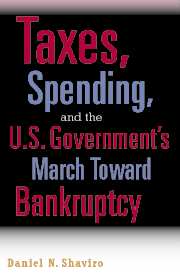Book contents
- Frontmatter
- Contents
- Acknowledgments
- Part 1 Labels and Consequences: The Failure of Our Fiscal Language
- Part 2 The Why and How of Long-Term Budgeting
- Part 3 Labels and Policies across Budget Categories
- 7 Benign Fictions? Describing Social Security and Medicare
- 8 Tax Expenditures
- 9 Welfare, Cash Grants, and Marginal Rates
- Part 4 Conclusion
- Notes
- Bibliography
- Index
7 - Benign Fictions? Describing Social Security and Medicare
Published online by Cambridge University Press: 18 December 2009
- Frontmatter
- Contents
- Acknowledgments
- Part 1 Labels and Consequences: The Failure of Our Fiscal Language
- Part 2 The Why and How of Long-Term Budgeting
- Part 3 Labels and Policies across Budget Categories
- 7 Benign Fictions? Describing Social Security and Medicare
- 8 Tax Expenditures
- 9 Welfare, Cash Grants, and Marginal Rates
- Part 4 Conclusion
- Notes
- Bibliography
- Index
Summary
[M]ight we contrive one of those opportune falsehoods … so as by one noble lie to persuade if possible the rulers themselves, but failing that the rest of the city?
– Socrates, in Plato's RepublicThose who think it permissible to tell white lies soon grow color-blind.
– Austin O'MalleyIf artful fiscal language had not already existed when Social Security was enacted in 1935, the program's proponents would have had to invent it. Social Security, along with its 1965 half-sibling Medicare, is a locus like few others for the carefully devised use of fiscal language to influence not just current voters but also future policy makers.
Until recently, the fiscal language history of Social Security and Medicare had two main aspects. One was the use of fiscal language to put the programs in as favorable a light as possible, helping them to become the widely noted twin “third rails” of American politics. The other was the creation of a set of fiscal language conventions to guide how the programs operate in practice, as a way of trying to keep them on their intended course.
These two parts of the story, while closely related, are in some ways quite distinct. The use of fiscal language to enhance the programs' political prospects comes close to the territory of the “noble lie.” Operating conventions, by contrast, might actually become true behavioral constraints, like the requirement that everyone drive on the right side of the road.
- Type
- Chapter
- Information
- Publisher: Cambridge University PressPrint publication year: 2006



